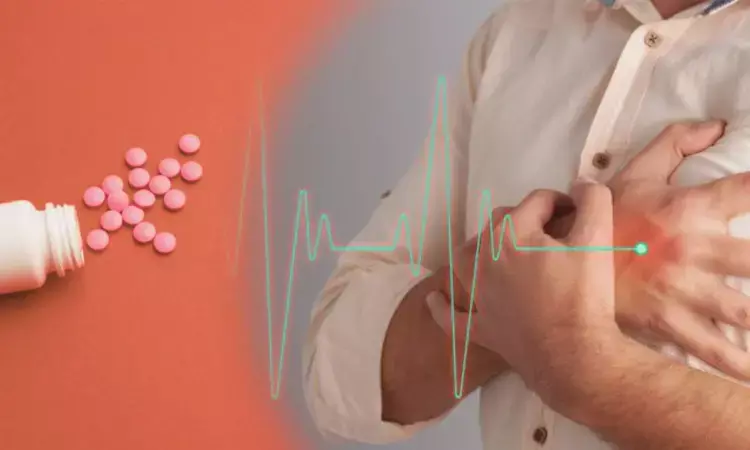- Home
- Medical news & Guidelines
- Anesthesiology
- Cardiology and CTVS
- Critical Care
- Dentistry
- Dermatology
- Diabetes and Endocrinology
- ENT
- Gastroenterology
- Medicine
- Nephrology
- Neurology
- Obstretics-Gynaecology
- Oncology
- Ophthalmology
- Orthopaedics
- Pediatrics-Neonatology
- Psychiatry
- Pulmonology
- Radiology
- Surgery
- Urology
- Laboratory Medicine
- Diet
- Nursing
- Paramedical
- Physiotherapy
- Health news
- Fact Check
- Bone Health Fact Check
- Brain Health Fact Check
- Cancer Related Fact Check
- Child Care Fact Check
- Dental and oral health fact check
- Diabetes and metabolic health fact check
- Diet and Nutrition Fact Check
- Eye and ENT Care Fact Check
- Fitness fact check
- Gut health fact check
- Heart health fact check
- Kidney health fact check
- Medical education fact check
- Men's health fact check
- Respiratory fact check
- Skin and hair care fact check
- Vaccine and Immunization fact check
- Women's health fact check
- AYUSH
- State News
- Andaman and Nicobar Islands
- Andhra Pradesh
- Arunachal Pradesh
- Assam
- Bihar
- Chandigarh
- Chattisgarh
- Dadra and Nagar Haveli
- Daman and Diu
- Delhi
- Goa
- Gujarat
- Haryana
- Himachal Pradesh
- Jammu & Kashmir
- Jharkhand
- Karnataka
- Kerala
- Ladakh
- Lakshadweep
- Madhya Pradesh
- Maharashtra
- Manipur
- Meghalaya
- Mizoram
- Nagaland
- Odisha
- Puducherry
- Punjab
- Rajasthan
- Sikkim
- Tamil Nadu
- Telangana
- Tripura
- Uttar Pradesh
- Uttrakhand
- West Bengal
- Medical Education
- Industry
Loop Diuretics in Heart Failure: Torsemide and furosemide equally effective regardless of HF type

A recent post hoc analysis of the TRANSFORM-HF trial explored the clinical profiles and outcomes of heart failure (HF) patients treated with torsemide versus furosemide, focusing on differences between de novo HF and worsening chronic HF (WHF). This study was published in JAMA Cardiology by Selim R. and colleagues.
The study included 2,858 patients with documented ejection fraction, revealing that 838 patients had de novo HF, and 2,020 had WHF. Noteworthy distinctions were observed, with de novo HF patients being younger, having a higher glomerular filtration rate, lower natriuretic peptide levels, and receiving lower doses of loop diuretics compared to WHF patients.
De novo HF was associated with lower all-cause mortality at 12 months (9.1% vs. 25.4% in WHF).
Patients with de novo HF exhibited lower all-cause first rehospitalization rates and greater improvement in the Kansas City Cardiomyopathy Questionnaire Clinical Summary Score at 12 months.
Torsemide and furosemide showed no significant difference in mortality, hospitalization rates, or total hospitalizations at 12 months for both de novo HF and WHF.
The analysis concludes that patients with de novo HF experience better clinical and patient-reported outcomes compared to those with WHF. Additionally, the choice between torsemide and furosemide did not significantly impact clinical or patient-reported outcomes over the 12-month period, irrespective of HF type.
This study sheds light on the nuanced differences in HF presentations and emphasizes the need for tailored treatment approaches based on HF type. The findings underscore the comparable effectiveness of torsemide and furosemide in managing HF, providing clinicians with valuable insights into optimizing diuretic strategies for improved patient outcomes.
Reference:
Krim, S. R., Anand, S., Greene, S. J., Chen, A., Wojdyla, D., Vilaro, J., Haught, H., Herre, J. M., Eisenstein, E. L., Anstrom, K. J., Pitt, B., Velazquez, E. J., & Mentz, R. J. Torsemide vs furosemide among patients with new-onset vs worsening chronic Heart Failure: A substudy of the TRANSFORM-HF randomized clinical trial. JAMA Cardiology,2023. https://doi.org/10.1001/jamacardio.2023.4776
Dr Riya Dave has completed dentistry from Gujarat University in 2022. She is a dentist and accomplished medical and scientific writer known for her commitment to bridging the gap between clinical expertise and accessible healthcare information. She has been actively involved in writing blogs related to health and wellness.
Dr Kamal Kant Kohli-MBBS, DTCD- a chest specialist with more than 30 years of practice and a flair for writing clinical articles, Dr Kamal Kant Kohli joined Medical Dialogues as a Chief Editor of Medical News. Besides writing articles, as an editor, he proofreads and verifies all the medical content published on Medical Dialogues including those coming from journals, studies,medical conferences,guidelines etc. Email: drkohli@medicaldialogues.in. Contact no. 011-43720751


